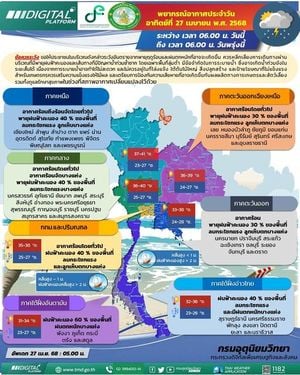Dr. Janette Nesheiwat, nominated by President-elect Donald Trump as the Surgeon General, carries with her not only credentials as a physician but also the weight of a tragic past. At the tender age of 13, she was involved in a life-altering accident when she knocked over a handgun, unintentionally shooting her father, Ziad "Ben" Nesheiwat. This incident left her father dead and ignited her path toward medicine, shaped by the harrowing experience.
The incident, reported by The New York Times, took place back in February of 1990. While searching for scissors, Nesheiwat was at her father's bedside when the accident unfolded. A tacklebox—a seemingly innocent container—toppled over, causing the .380 caliber handgun it housed to fall and discharge, fatally injuring her father. Nesheiwat remembers the chilling aftermath vividly, stating, “I saw blood on my father’s ear,” which later led to her father being declared deceased the following day at an Orlando hospital. This unforeseen tragedy was officially ruled as accidental.
Reflecting on this traumatic childhood moment, Nesheiwat penned her memoir, Beyond the Stethoscope, published in 2017. She describes the enduring impact of her father’s death, saying, “The trauma of the moment clung to me like a relentless shadow, unraveling the fabric of my young life.” Her memories of the incident are not just mere recollections; they have become foundational to her motivations as she chose to pursue medicine, as she confessed, “I couldn’t save his life. This was the start of my personal...journey to become a physician.” While her memoir reveals her pain, it curiously excludes mention of her direct role—an aspect of her past she has opted not to publicly acknowledge until now.
The nomination of Dr. Nesheiwat has sparked conversations around not only her qualifications as a physician but also how her past informs her work. After her father’s death, her family faced grief and the need for financial stability. Her mother, Hayat Nesheiwat, took on extra shifts as a pediatric nurse, and Janette began working at fast food restaurants at 16 to help support the family. These experiences cultivated resilience within the Nesheiwat family, enabling them to navigate their pain and emerge stronger together. Julia Nesheiwat, Janette’s sister, explained, stating, “We set our minds to turning this tragedy around, and it worked. We became strong.”
Dr. Nesheiwat’s career has since flourished. After her medical training, she became involved with urgent care, holding the position of Medical Director for CityMD, where she led efforts through various healthcare crises, including the COVID-19 pandemic. Her extensive background positioned her uniquely as the U.S. Surgeon General, where she would be expected to advocate passionately for public health and preventive medicine. This experience culminated with Trump calling her nomination significant, underscoring her frontline work during the pandemic as pivotal.
Nesheiwat’s choice to become a doctor resonates with her intention not just to practice medicine but to impact lives positively. Trump described her as, “a fierce advocate and strong communicator,” emphasizing her dedication to public health initiatives. It is evident Trump values her personal narrative as central to her role—claiming her past trauma feeds her drive to save lives.
While Dr. Nesheiwat remains focused on her groundbreaking responsibilities as the Surgeon General, her family's story speaks volumes about resilience, tragedy, and the power of personal adversity. Within political spheres, her nomination is poised to evoke reflection on gun safety and medical advocacy, inviting dialogue on the impacts of accidents and personal responsibility.
Despite the heartache, the Nesheiwat family’s narrative transforms tragedy to triumph. Each sibling has made their mark, with Julia becoming Trump’s homeland security advisor and others pursuing successful careers ranging from modeling to law. This speaks to the family’s determination to not only honor the memory of their father but also to pave their paths forward, deeply entwined with their unique experiences.
Trump's announcement on November 22, 2024, introduced Dr. Nesheiwat as someone who embodies hope and care for the American public. “She will help advance health initiatives,” he remarked, hinting at the potential she holds to reshape healthcare discourse as she steps onto the national stage. The nomination serves not only as recognition of her qualifications but also as acknowledgment of how personal histories shape public lives. Her past does not define her; rather, it propels her forward as she seeks to advocate for health and wellbeing across the country.
Dr. Janette Nesheiwat's story is framed by tragedy, but it also fosters hope—serving as both cautionary and inspirational, marked by the belief in healing and growth following calamity. The legacy of her father’s untimely death continues to resonate, pushing her to fight for lives as she walks onto the next chapter of her professional life, ready to take on new challenges and responsibilities as Surgeon General. Through her experience, she not only honors her father’s memory but also creates her path, driven by the desire to improve the lives of countless others.



